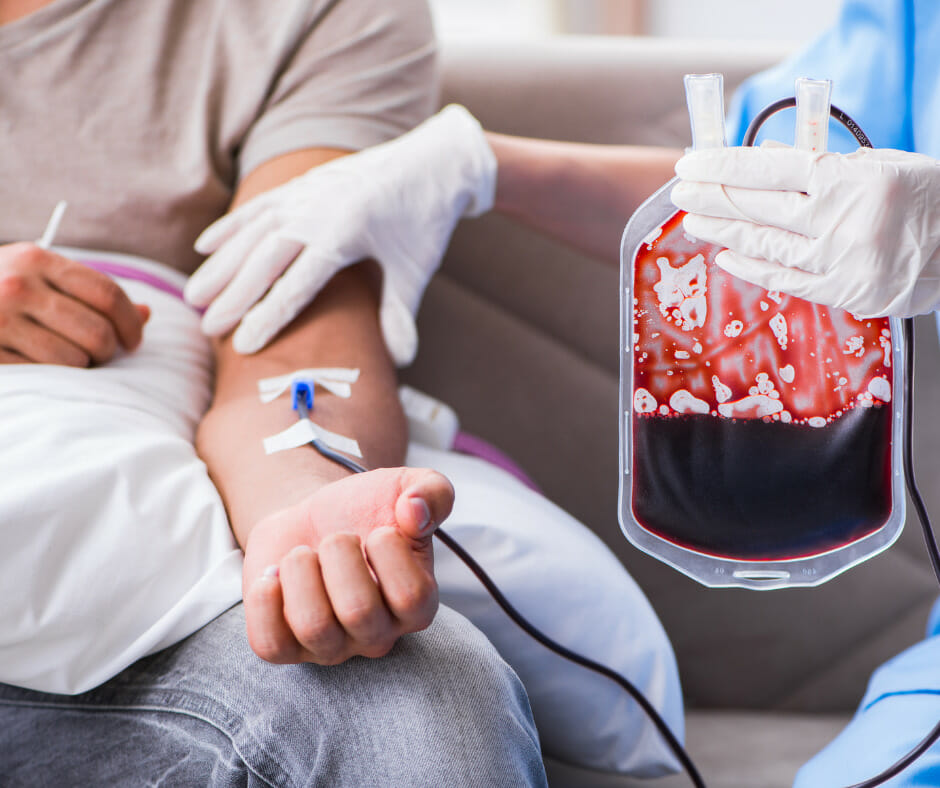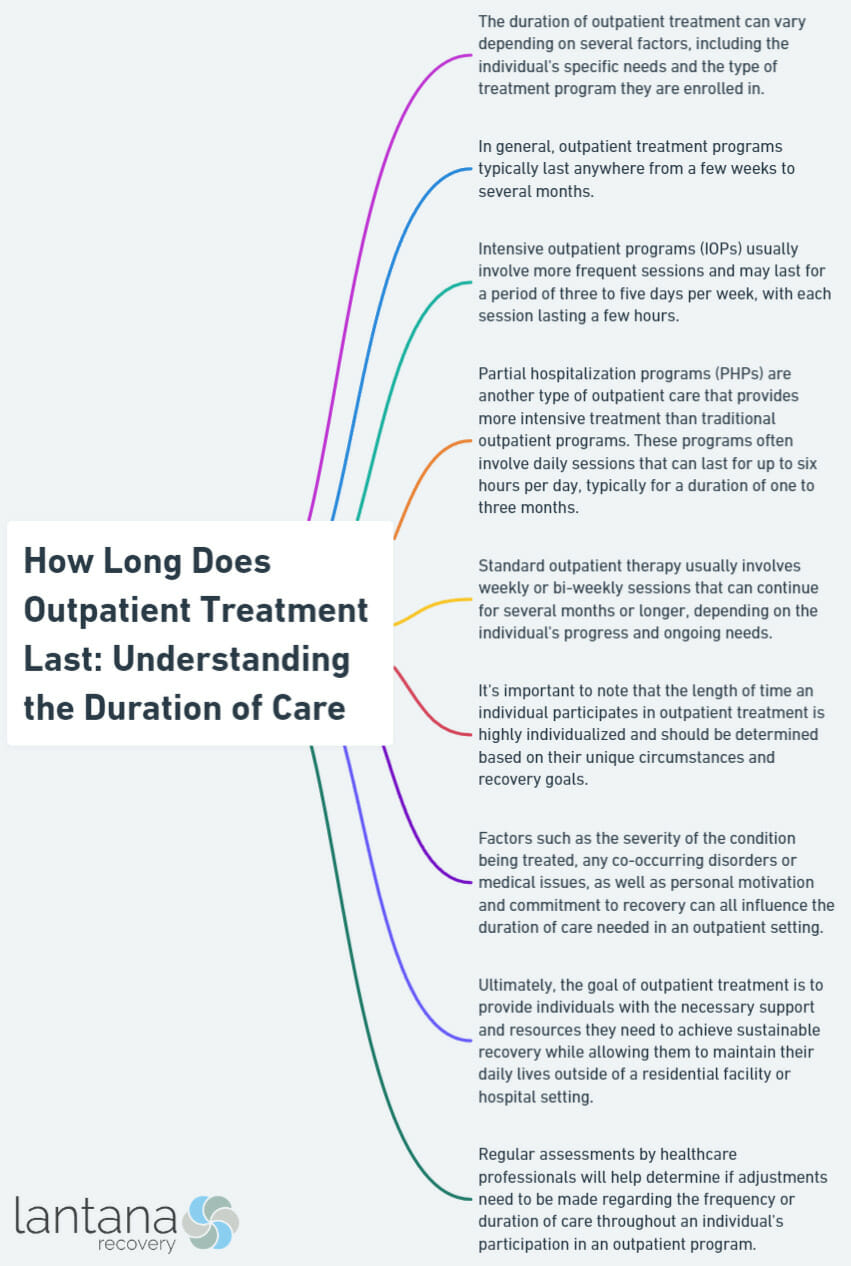Outpatient treatment is a popular and effective form of care for individuals seeking treatment for various mental health and substance abuse issues. Outpatient treatment allows individuals to receive care while still living at home and maintaining their daily routines. Understanding the duration of outpatient treatment is essential for individuals seeking this form of care.
Factors such as the severity of the condition, response to treatment, co-occurring disorders, and personal circumstances play a significant role in determining the duration of outpatient treatment. This article will provide an overview of short-term, medium-term, and long-term outpatient treatment, along with the typical expectations and durations for each.
Short-term outpatient treatment involves a more focused approach to addressing specific issues and may include individual therapy sessions or group counseling. Medium-term outpatient treatment provides a more comprehensive approach, combining various therapeutic modalities to address underlying causes and facilitate long-term recovery. Long-term outpatient treatment offers ongoing support and maintenance to ensure sustained progress and prevent relapse.
The length of outpatient treatment can vary depending on individual needs, progress, and goals. Factors such as the severity of the condition, response to treatment, co-occurring disorders, and personal circumstances all play a role in determining the length of treatment.
While shorter durations may be suitable for individuals with milder conditions and fewer challenges, longer durations of outpatient treatment have several benefits. These include more time for comprehensive healing, increased support and guidance, opportunities for continued skill-building and relapse prevention, and a higher likelihood of sustained recovery.
By understanding the duration of outpatient treatment and the factors that influence it, individuals can make informed decisions and approach their recovery journey with realistic expectations.

Understanding Outpatient Treatment
Outpatient treatment, also known as ambulatory care, offers individuals the opportunity to receive medical attention and services outside of a hospital setting. It provides flexibility and convenience for those seeking healthcare. Here are some important aspects to keep in mind as you start an intensive outpatient program:
- Flexibility: Outpatient treatment provides patients with the flexibility to schedule appointments during the day and return home in the evening. This offers great benefits to individuals who have work or family commitments.
- Cost-effective: Outpatient care is typically more affordable compared to inpatient treatment. It eliminates additional expenses such as accommodation and meals that are associated with hospital stays.
- Minimal disruption: With outpatient treatment, individuals can maintain their regular routines and responsibilities. This minimizes any disruptions to work, school, or family life.
- Comprehensive options: Outpatient treatment encompasses a broad range of medical services, including diagnostic tests, therapy sessions, counseling, and specialized rehabilitation programs. It is suitable for addressing mental health disorders, substance abuse, and chronic illnesses.
- Supportive network: Outpatient treatment involves the active involvement of the patient’s support system, including family, friends, and community resources. This collaborative approach helps individuals develop a stable support network crucial for their recovery.
Fact: According to a study conducted by the Substance Abuse and Mental Health Services Administration (SAMHSA), approximately 60% of substance abuse treatment admissions in the United States involve outpatient treatment programs. By understanding outpatient treatment, individuals can make informed decisions about their healthcare journey and access the appropriate level of care based on their specific needs.
What is the Duration of Outpatient Treatment?
Curious about the duration of outpatient treatment? Dive into the factors that influence its duration to gain a comprehensive understanding. Tap into insightful data, expert opinions, and real-life cases to explore what determines the length of outpatient treatment. No more guesswork – let’s uncover the key elements that shape this vital aspect of care.
Factors That Determine the Duration of Outpatient Treatment
The duration of outpatient treatment is determined by several factors. These factors, which include the severity of the patient’s condition, their response to treatment, the presence of co-occurring disorders, and their personal circumstances, play a crucial role in determining the length of treatment.
In cases where the condition is more severe, a longer treatment period may be necessary. Conversely, if the patient responds positively to the treatment and exhibits improvements, the duration of outpatient treatment can be shortened.
When a patient is dealing with co-occurring disorders, such as substance abuse and mental health issues, the treatment duration tends to be longer. This is due to the complexities involved in addressing multiple conditions simultaneously.
Additionally, personal circumstances like support systems, available resources, and external stressors can significantly impact the overall duration of treatment. These factors are taken into account by the treatment team when developing a personalized treatment plan.
It’s important to acknowledge that the duration of outpatient treatment can vary greatly from person to person. The unique combination of these factors determines the length of treatment required for each individual.

Short-term Outpatient Treatment
Short-term outpatient treatment is a valuable option for individuals seeking care for mental health or substance abuse issues. For instance, a study by Riedle et al., has found that their research underscores the value of providing free short-term group psychotherapy for people with mental health concerns through social health providers. Here are some key points to consider:
- Flexibility: Short-term outpatient treatment allows individuals to receive care while maintaining their daily routines and responsibilities. This flexibility makes it easier for people to seek help without disrupting work or personal life.
- Therapeutic services: Short-term outpatient treatment includes individual counseling, group therapy, and psychiatric evaluations. These services address specific needs and provide support during recovery.
- Duration and frequency: The duration and frequency of short-term outpatient treatment can vary based on individual needs. It involves attending sessions once or twice a week for a specific number of weeks or months.
- Continuity of care: Short-term outpatient treatment provides immediate support and interventions. It aims to equip individuals with coping skills and strategies to manage symptoms effectively. However, a plan for continued care or aftercare is important once short-term treatment is completed.
- Cost-effective: Compared to inpatient or residential treatment, short-term outpatient treatment is often more cost-effective. It allows individuals to receive quality care while minimizing the financial burden.
True Story: Sarah, a young woman struggling with anxiety and depression, wanted to seek treatment but was hesitant about taking time off from work. With the support of her therapist, Sarah decided to pursue short-term outpatient treatment.
Over three months, Sarah attended therapy sessions twice a week. She found comfort in discussing her challenges with a supportive therapist and gained insights through group therapy. The program’s flexibility allowed her to continue working and managing her responsibilities without interruption.
Through the therapeutic services provided, Sarah developed coping mechanisms, improved her mental health, and gained a support network. The short-term treatment was a significant step toward her overall well-being, and she continues to utilize the skills she learned to maintain her mental health.
What to Expect During Short-term Outpatient Treatment?
Unlike intensive inpatient therapy, during short-term outpatient treatment, individuals can expect to receive specific therapy and support that promote recovery. Here are some aspects to anticipate during short-term outpatient treatment:
1. Individual therapy: Throughout this treatment, patients will engage in one-on-one sessions with a licensed therapist. These sessions aim to address personal issues, explore underlying causes, and develop effective coping strategies.
2. Group therapy: Patients will have the opportunity to connect with others who are experiencing similar challenges. Group therapy sessions provide a supportive environment where patients can learn from each other and develop a sense of community.
3. Psychoeducation: As part of the treatment, patients will receive valuable information about their condition. This information includes causes, symptoms, and strategies for effective management. Psychoeducation aims to help patients understand their situation and equip them with self-care tools.
4. Medication management: If necessary, medication may be prescribed to manage symptoms or stabilize mental health conditions. During the course of the treatment, patients can expect regular monitoring, adjustments, and discussions with a psychiatrist or medical professional.
5. Supportive resources: Short-term outpatient treatment often includes access to additional resources such as support groups, crisis hotlines, or online forums. These resources provide ongoing assistance and support outside of treatment sessions.
6. Goal setting: Patients and healthcare providers will collaborate to establish achievable goals for treatment. These goals may include symptom reduction, improved coping skills, or strategies for maintaining overall well-being.
Understanding what to expect during short-term outpatient treatment is crucial as it helps individuals prepare for their recovery journey and maximize the benefits they will receive from the treatment.
Typical Duration of Short-term Outpatient Treatment
As you learn more about what addiction is, the typical duration of short-term outpatient treatment can vary based on the severity of the condition, the response to treatment, the presence of co-occurring disorders, and personal circumstances.
Generally, these programs last for a few weeks to a few months, providing intensive support and therapy while allowing individuals to continue living at home. During treatment, individuals receive regular therapy sessions, both individual and group, to address underlying issues and teach coping skills.
Typically, the typical duration of short-term outpatient treatment lasts around 6 to 12 weeks, allowing for sufficient time to address immediate concerns and begin the healing process. However, the typical duration of short-term outpatient treatment can vary based on an individual’s progress and needs.
The goal of the typical duration of short-term outpatient treatment is to equip individuals with tools and support to effectively manage their condition and transition back to their daily lives.

Medium-term Outpatient Treatment
When considering medium-term outpatient treatment, keep in mind these key factors:
1. Frequency of sessions: Medium-term outpatient treatment involves attending therapy sessions regularly. These sessions may be scheduled weekly or bi-weekly, depending on the individual’s needs and condition severity.
2. Duration of treatment: Medium-term treatment extends over a longer period compared to short-term outpatient treatment. It can range from several months to a year or more. The length of treatment depends on progress made and therapy goals.
3. Therapeutic modalities: Medium-term outpatient treatment uses various therapeutic modalities to address specific needs. This can include individual therapy, group therapy, family therapy, and specialized interventions like cognitive-behavioral therapy or dialectical behavior therapy.
4. Goal-oriented approach: Medium-term outpatient treatment focuses on setting and achieving specific goals. These goals can be related to symptom reduction, skill-building, improving relationships, or developing coping strategies. The therapist and individual collaborate to establish these goals and track progress.
5. Supportive services: Aside from therapy sessions, medium-term outpatient treatment may involve accessing supportive services. This includes psychiatric consultations, medication management, and referrals to community resources for additional support.
It’s important to note that the duration and specific elements of medium-term outpatient treatment may vary based on individual needs and the treatment plan developed by the therapist. Working closely with a mental health professional can help tailor the treatment to meet the individual’s unique circumstances and goals.
What to Expect During Medium-term Outpatient Treatment?
During medium-term outpatient treatment, patients can expect a structured and intensive recovery experience. Here is a breakdown of what to expect during this type of treatment:
1. Regular therapy: Patients will attend scheduled therapy sessions, which may include individual, group, and family therapy. This provides patients with an opportunity to discuss their progress, and challenges, and receive guidance and support from their therapists.
2. Skill-building exercises: Patients will engage in exercises aimed at enhancing their coping mechanisms and problem-solving abilities. These exercises will focus on stress management, communication skills, and relapse prevention strategies.
3. Medication management: If medication is a part of the treatment plan, patients will receive regular management to ensure the proper dosage and effectiveness. This may involve check-ins with a psychiatrist or other medical professionals to monitor their progress and make any necessary adjustments.
4. Supportive network: Patients will have access to a dedicated network of healthcare professionals who are committed to their recovery. This includes therapists, counselors, and staff members who will provide guidance and support throughout the treatment process.
5. Continued care planning: Medium-term outpatient treatment is just one part of a comprehensive plan. Ongoing care planning will involve identifying support groups, aftercare options, and strategies for maintaining long-term recovery.
Active participation and engagement in addiction treat`ment are crucial for maximizing the benefits and achieving your recovery goals during medium-term outpatient treatment.
Typical Duration of Medium-term Outpatient Treatment
The typical duration can range from 4 to 12 weeks. The severity of the condition plays a crucial role in determining the length of treatment, with more severe cases often requiring a longer duration.
Over a span of 6 to 12 weeks, gradual improvement is typically observed. It’s important to note that co-occurring disorders may necessitate additional time for adequate treatment.
Furthermore, personal circumstances, including support systems and available resources, can also affect the duration of treatment. Research indicates that longer durations of outpatient treatment tend to yield better outcomes and reduce the risk of relapse.
Since each person’s journey is unique, the duration of treatment may vary based on individual needs and progress.

Long-term Outpatient Treatment
Long-term outpatient treatment, also known as long-term outpatient care, is a crucial form of medical and mental health support.
- This type of treatment ensures ongoing assistance and care for individuals facing various medical and mental health conditions.
- It involves regular therapy sessions conducted by a qualified healthcare professional, proper management of medication, and access to peer support through group therapy sessions.
- One of the notable advantages of long-term outpatient treatment is that it allows individuals to maintain flexibility and autonomy in their daily routines while still receiving the necessary support and care.
- This approach emphasizes continued monitoring and follow-up appointments to ensure progress and address any concerns that may arise.
Overall, this comprehensive approach promotes long-lasting recovery and significantly improves the well-being of individuals who require ongoing support for their medical and mental health conditions.
What to Expect During Long-term Outpatient Treatment?
Long-term outpatient treatment is a comprehensive approach to addressing conditions and disorders. It provides structured and ongoing therapy to promote recovery and well-being. Here are key aspects to expect during long-term outpatient treatment:
1. Regular therapy sessions: Individuals attend individual and group therapy sessions in a safe and supportive environment to address underlying issues.
2. Customized treatment plans: Personalized plans tailored to each person’s needs may include cognitive-behavioral therapy, family therapy, or medication management.
3. Skill-building and coping strategies: Long-term outpatient treatment focuses on equipping individuals with the necessary skills for recovery, such as healthy communication, stress management, and self-care practices.
4. Support network: Connecting with others going through similar experiences provides encouragement and understanding.
5. Flexibility and continued integration: Unlike inpatient treatment, individuals can continue their daily activities while receiving support. This promotes the integration of learned skills into real-life situations.
Specific details of treatment can vary based on the individual’s condition, goals, and progress. Adhering to the treatment plan and actively participating in therapy enhance effectiveness.
Typical Duration of Long-term Outpatient Treatment
The typical duration of long-term outpatient treatment can vary based on individual needs and factors such as severity, response to treatment, co-occurring disorders, and personal circumstances. For instance, a study by Mennis et al., titled How long does it take to complete outpatient substance use disorder treatment? has found that even after considering treatment duration, disparities in treatment completion continue to exist, indicating the influence of other factors, such as economic, cultural, or discriminatory aspects.
Long-term outpatient treatment is a program that extends for a longer period compared to short-term or medium-term treatment. This allows individuals to receive ongoing care, support, and therapy while maintaining their daily lives and responsibilities.
The typical duration can range from several months to a year or more. This extended timeframe ensures consistent and regular therapy sessions, group support, and progress monitoring. Factors like severity and response to treatment can influence the length of treatment. Co-occurring disorders and underlying mental health conditions may require additional time for effective management. Personal circumstances, such as external support systems and commitments, can also impact the decision to continue long-term outpatient treatment.
Factors Affecting the Length of Outpatient Treatment
Embarking on an outpatient treatment journey can bring about significant changes, but have you ever wondered what factors contribute to the length of such treatment? In this section, we’ll uncover the key elements that affect the duration of outpatient treatment. From the severity of the condition to one’s response to treatment, the presence of co-occurring disorders, and personal circumstances, each factor plays a crucial role in determining the timeline of your treatment. Get ready to unravel the mysteries surrounding the length of outpatient care!
1. Severity of the Condition
The duration of outpatient treatment is determined by the severity of the condition. The severity of the condition refers to how serious or advanced the illness or condition is.
In cases of mild or early-stage conditions, outpatient treatment may be shorter. The individual may require less intensive therapy to manage symptoms and improve well-being.
On the other hand, for severe or advanced conditions, outpatient treatment is likely to be longer. More time and resources are needed to effectively address complex needs. The individual may need regular therapy, medication management, and ongoing support.
It’s important to note that the severity of the condition is not the sole factor in determining treatment duration. The individual’s response to treatment, co-occurring disorders, and personal circumstances also contribute. A comprehensive assessment of these factors is necessary to develop an individualized treatment plan.
2. Response to Treatment
Outpatient treatment response plays a pivotal role in determining the length of treatment. It is a measure of how well a patient is progressing during their treatment journey. The response to treatment can vary significantly from one patient to another. “In earlier research, treatment satisfaction has been associated with positive therapy outcomes measured with conventional measures like retention or substance-taking behaviour” (Factors predicting satisfaction in outpatient substance abuse treatment: a prospective follow-up study, Kuusisto & Lintonen, 2020.)
Some individuals may experience rapid and significant improvement, while others may have a more gradual and moderate improvement over a longer period of time. It is important to understand that the response to treatment is not solely determined by the duration of treatment, but also by the individual’s specific condition and circumstances.
Healthcare professionals closely monitor the response to treatment. If the desired improvement is not observed within the expected timeframe, these professionals may make adjustments to the treatment plan. On the other hand, if there is positive and encouraging progress, the treatment may be extended to ensure continued success for the patient.
3. Co-occurring Disorders
Co-occurring disorders, also known as dual diagnosis or comorbidity, refer to the simultaneous presence of a substance use disorder and a mental health disorder. These co-occurring conditions pose a common concern within outpatient treatment settings. To effectively address and treat these disorders, a comprehensive approach is necessary. This approach encompasses therapy, medication management, and support services.
The primary objective is to address both the mental health symptoms and the addiction concurrently, ensuring a coordinated and integrated treatment plan. This holistic approach significantly enhances an individual’s prospects of achieving long-term recovery. The duration of treatment for co-occurring disorders can vary, depending on multiple factors such as the severity of the conditions, response to treatment, and personal circumstances.
To ensure the best outcomes, each individual’s treatment plan is tailored to their unique needs and progress. By integrating the treatment of co-occurring disorders into outpatient care, individuals can effectively manage their mental health and addiction issues. This approach promotes a healthier and more sustainable recovery journey.
4. Personal Circumstances
1. Availability of support system: A strong support system enhances outpatient treatment. Supportive family and friends who understand and provide assistance contribute to better outcomes.
2. Work and school commitments: Work or school demands impact outpatient treatment duration. Flexible schedules or the ability to take time off allow for regular therapy sessions and treatment activities.
3. Financial resources: The cost of outpatient treatment varies based on location, type, and duration. Limited financial resources require considering budget and insurance coverage when deciding on treatment length.
4. Motivation and commitment: Personal motivation and commitment are crucial for positive outcomes. Highly motivated individuals actively participate in treatment and adhere to recommended duration.
5. Stressors and triggers: Identifying and managing stressors and triggers is essential. High levels of stress or ongoing exposure may require longer treatment durations to develop effective coping strategies and maintain sobriety.
6. Co-occurring mental health conditions: The presence of co-occurring mental health conditions affects treatment duration. Complex treatment needs may require a longer duration to address both substance use disorder and underlying mental health conditions. Over the last decade, there have been suggestions to integrate substance abuse treatment with primary medical and mental health care systems, aiming to provide optimal care for affected individuals.
True Story: John, a 30-year-old struggling with alcohol addiction, underwent outpatient treatment. He had a supportive family who understood his addiction challenges and provided encouragement throughout his recovery. John had a flexible work schedule that allowed multiple therapy sessions a week. However, he had limited financial resources and had to consider his insurance coverage to manage treatment costs. Despite financial constraints, John was highly motivated and committed to recovery. He recognized stressors and triggers and actively worked on developing coping mechanisms. Additionally, John had an anxiety diagnosis, extending his treatment duration as therapists addressed both alcohol addiction and anxiety disorder. With dedication and support, John successfully completed a medium-term outpatient treatment program and continued aftercare support for sobriety maintenance.
Benefits of Longer Duration of Outpatient Treatment
The benefits of a longer duration of outpatient treatment are extensive and contribute significantly to successful recovery. Extensive research has demonstrated that undergoing treatment for a period of 90 days or more leads to improved outcomes, including reduced substance use and enhanced psychological well-being.
Furthermore, the longer treatment allows for a greater opportunity to build trust, engage in the process, and explore underlying issues. It provides individuals with more chances to acquire and practice vital coping mechanisms, thereby preventing relapse in the long run.
Additionally, a prolonged treatment duration supports a holistic approach to overall well-being by incorporating supplementary therapies such as art therapy, mindfulness practices, exercise, and nutritional counseling. Investing in an extended outpatient treatment program can greatly enhance the overall well-being and long-term recovery of individuals while also positively impacting families, communities, and the healthcare system.

Frequently Asked Questions
How long does outpatient treatment last?
The duration of outpatient treatment can vary depending on the individual’s needs and progress in their recovery journey. It can range from a few months to over a year, with the length of treatment determined by personal judgment and the severity of the substance abuse problem.
What is the difference between intensive outpatient programs and general outpatient programs?
Intensive outpatient programs (IOP) provide a more structured and comprehensive treatment approach. Individuals typically attend sessions several days a week for a minimum of 90 days, receiving consistent addiction treatment. General outpatient programs involve attending one or two sessions per week with peers for accountability and checking in.
Are outpatient programs effective for treating substance abuse?
Yes, outpatient programs can be effective methods for treating substance abuse, especially for individuals who recognize their problem early on and are coping well in their daily lives. These programs offer a continuum of care and support, helping individuals maintain their physical and mental well-being while receiving treatment.
What types of services are provided in an outpatient treatment program?
Outpatient treatment programs offer a range of services tailored to individual needs, including individual therapy sessions, group meetings, medication-assisted treatment (if necessary), relapse prevention training, social skills development, and restructuring thoughts and attitudes to reduce cravings. These comprehensive services aim to address and overcome the challenges of addiction.
What happens after completing an intensive outpatient program?
After completing an intensive outpatient program, individuals may transition to a less frequent general outpatient program or continue their recovery journey through community support groups, such as 12-step meetings. It is essential to maintain ongoing support and follow-up care to prevent relapse and achieve long-term sobriety.
Is individual therapy necessary after completing an addiction treatment program?
The need for individual therapy after completing an addiction treatment program varies depending on the individual’s progress and any underlying mental health conditions. If necessary, continuing behavioral therapy with a mental health service plan for a year or more may be recommended to manage mental health and maintain sobriety.









